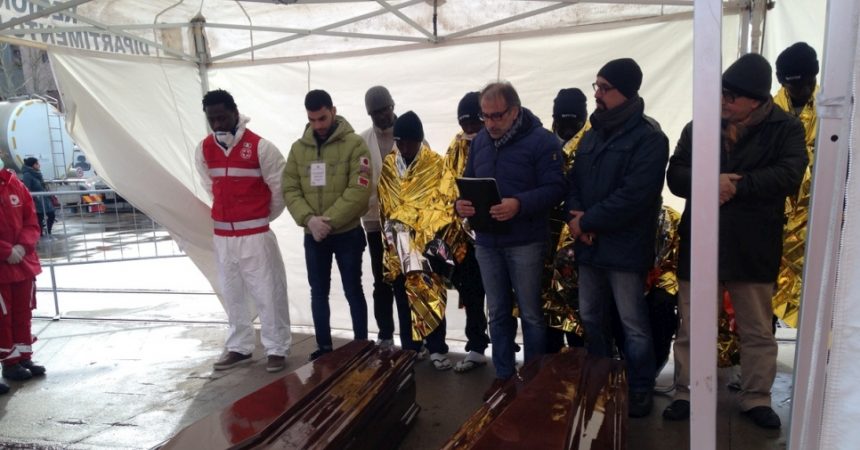An average of four people has died every day this year, trying to cross the Mediterranean from North Africa to Europe, a total of 1,226 and counting, according to a new report from The New Humanitarian.
Asides from these deaths, 29,427 have been intercepted and returned by the Libyan Coastguard, supported by the EU. Upon reaching Libya, they face detention, torture, sexual abuse, and extortion.
Peter Stano, the lead European Commission spokesperson for foreign affairs, told The New Humanitarian that “our top priority is saving lives at sea, and we will continue our work to prevent these risky journeys from taking place.” He did not say anything about what happened to them upon arrival back in Libya.
The report also found that the interceptions made by the Libyan Coast Guard reduce search and rescue capacity and increase the likelihood of both shipwrecks and deaths.
It notes that search and rescue activities are supposed to follow a particular format. Once the national rescue coordination centre hears about a boat in distress, they notify nearby vessels or dispatch their assets. Once the rescue is complete, survivors should be disembarked in a place of safety.
But the EU-backed migration control system in the Mediterranean does things differently. Multiple different scenarios can play out, sometimes all simultaneously, and most with unfavourable results.
These include NGO vessels rescuing survivors, but the report notes that Malta does not allow disembarkment in its ports. This “exacerbates psychological trauma and delays urgent medical care.”
Other scenarios include the Maltese rescue services being made aware of a vessel in distress and just deferring responsibility to Libya, meaning they will be returned and at risk of mistreatment. Or they are asking a private ship to rescue them, which brings a whole host of other issues.
This situation is not a “tragic anomaly”. Still, it is the result of “concrete policy decisions and practices by the Libyan authorities, EU Member States, and other institutions and actors”, according to a report by the United Nations High Commissioner for Human Rights, cited in the report.
As a part of a 2015 objective from the EU to control irregular migration, the EU Member States like Italy and Malta have spent tens of millions of euros to train the Libyan Coast Guard, repair their boats, and guide authorities through search and rescue processes. A Libyan Rescue Coordination Centre was also established in Libya’s search and rescue region. But journalists and human rights groups say the centre does not exist, and the Libyan Coast Guard instead received information at an old military base in Tripoli.
Meanwhile, the report said that the EU Member States have withdrawn their search and rescue operations in the central Mediterranean and shifted responsibility to the Libyans. Furthermore, states have obstructed the work of NGO vessels, using administrative and criminal procedures to lock them into ports.
Stano told The New Humanitarian that the blame lies with smugglers and traffickers, and it is “unfair and incorrect to blame the European Union for the suffering of migrants trying to cross the Mediterranean from Libya.”
Malta got a special mention for its slow response and sometimes total failure to mobilise its search and rescue assets to help those in distress, even in Maltese waters.
“As a result, boats of migrants and asylum seekers are being intercepted more often by the Libyan Coast Guard – which has been documented opening fire at, ramming, and capsizing boats it is supposed to rescue,” the report notes.
It continues that those returned to Libya are detained in centres that are rampant with abuse or “disappeared by the thousands into shadowy, semi-official facilities where they are beyond the reach of international organisations.”
Those left behind are left to spend more time at sea, increasing the risk of shipwrecks and death.
Earlier this year, the Shift interviewed Julia Shaefermeyer, communications officer for SOS Mediterranee, an NGO conducting search and rescue missions in the region. She recounted harrowing testimonies from women who had survived Libya’s detention centres and made it across the Mediterranean.
One woman explained how she was imprisoned, raped, and tortured solidly for four months before she was left for dead in a container on the street. Her body showed significant signs of injury, including cigarette burns, when SOS Mediterranee picked her up.
Another reported being raped in detention and falling pregnant. She and her fiancee decided to keep the child, but the woman was beaten so savagely by the coast guard in Tripoli, she miscarried.
In another horrifying account, while waiting to board a vessel in Libya with her toddler, a guard startled him, and he ran into the crowd. She was prevented from chasing him, held a gun to her head, and was forced to board without him.
The Shift also interviewed the captain of a tanker that picked up stranded migrants, who explained that those on board, while waiting to find somewhere to disembark, had tried to commit suicide rather than risk returning to Libya.












